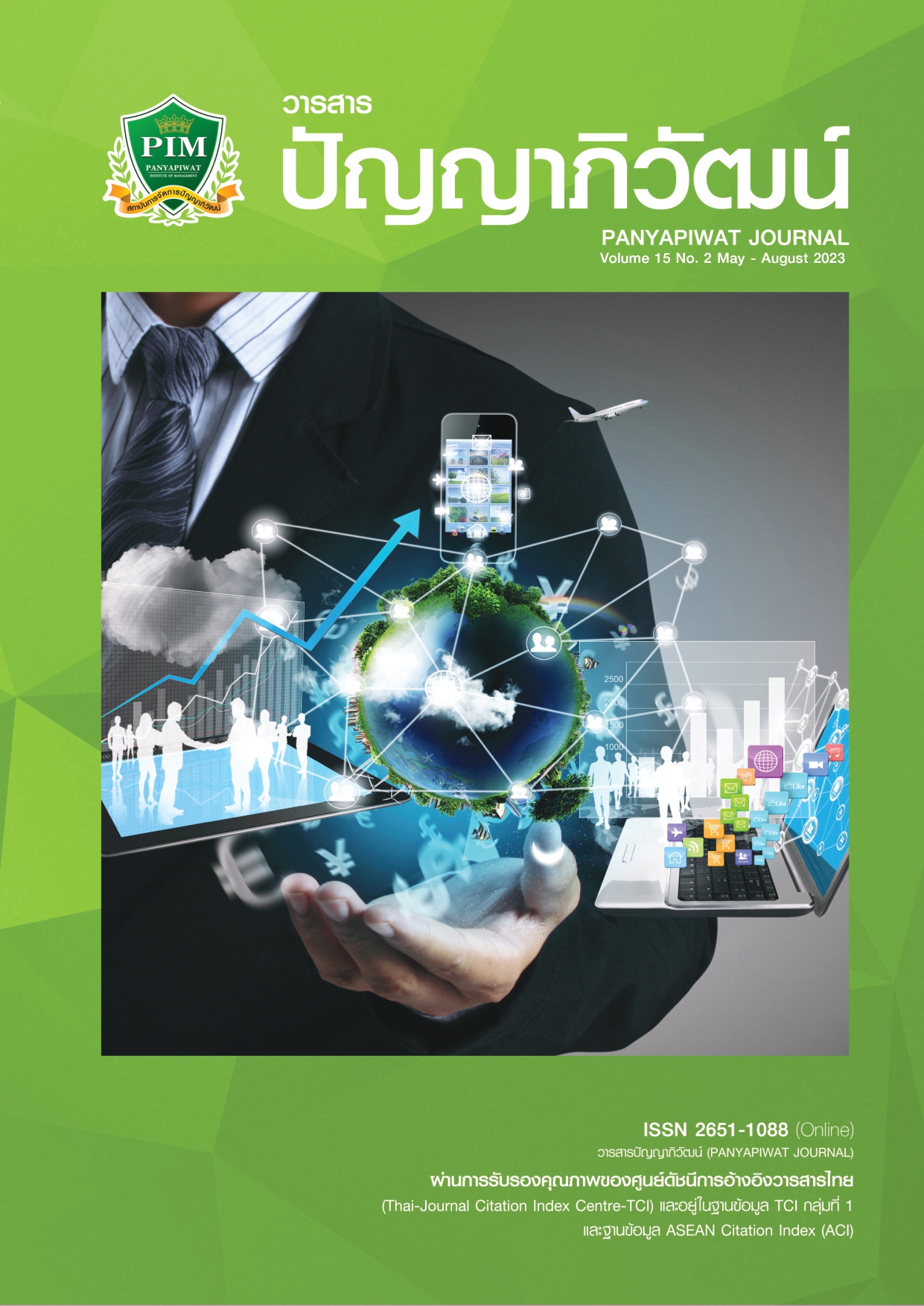CHINA-THAILAND INTERNATIONAL COOPERATION IN HIGHER EDUCATION IN THE POST COVID-19 ERA: EXPERIENCES AND PROSPECTS
Main Article Content
บทคัดย่อ
The study found three main experiences of the China-Thailand ICHE, including (1.1) transforming for the unplanned plan, (1.2) virtual mobility of students and teachers, and (1.3) seminars for academic and public and six prospects for future cooperation, including (2.1) flexible cooperation framework, (2.2) mutual accountability, (2.3) virtual cooperation, (2.4) quality of education exchange, (2.5) virtual research collaboration, and (2.6) digital infrastructure. Overall, the paper addressed opportunities and challenges for future ICHE. It demonstrated a cooperation mechanism assisting public and business sectors to outreach more innovative and comprehensive cooperation regarding the uncertainty of COVID-19.
Article Details

อนุญาตภายใต้เงื่อนไข Creative Commons Attribution-NonCommercial-NoDerivatives 4.0 International License.
“ข้าพเจ้าและผู้เขียนร่วม (ถ้ามี) ขอรับรองว่า บทความที่เสนอมานี้ยังไม่เคยได้รับการตีพิมพ์และไม่ได้อยู่ระหว่างกระบวนการพิจารณาลงตีพิมพ์ในวารสารหรือแหล่งเผยแพร่อื่นใด ข้าพเจ้าและผู้เขียนร่วมยอมรับหลักเกณฑ์การพิจารณาต้นฉบับ ทั้งยินยอมให้กองบรรณาธิการมีสิทธิ์พิจารณาและตรวจแก้ต้นฉบับได้ตามที่เห็นสมควร พร้อมนี้ขอมอบลิขสิทธิ์บทความที่ได้รับการตีพิมพ์ให้แก่สถาบันการจัดการปัญญาภิวัฒน์หากมีการฟ้องร้องเรื่องการละเมิดลิขสิทธิ์เกี่ยวกับภาพ กราฟ ข้อความส่วนใดส่วนหนึ่งและ/หรือข้อคิดเห็นที่ปรากฏในบทความข้าพเจ้าและผู้เขียนร่วมยินยอมรับผิดชอบแต่เพียงฝ่ายเดียว”
เอกสารอ้างอิง
Bureau of International Cooperation Strategy Office of the Permanent Secretary. (2020). Key issues influencing the future internationalization of higher education. Bureau of International Cooperation Strategy Office of the Permanent Secretary, Ministry of Higher Education, Science, Research and Innovation. http://www.inter.mua.go.th/adocs/DL/DL408.pdf
Cai, Y. (2019). China-europe higher education cooperation: Opportunities and challenges. Frontiers of Education in China, 14(2), 167-179. https://doi.org/10.1007/s11516-019-0009-5
Crain, D. E., Hollings, S., Kayode, H. M., Ogunniran, M. O., Worapot, Y., Guañuna, P., Yasmeen, T., Riaz, A., Samilo, A., Jiang, Y., Bolanle, O. F., Jackson, L., & Sturm, S. (2021). Knowledge socialism in the COVID-19 era: A collective exploration of needs, forms, and possibilities. Educational Philosophy and Theory, 54(6), 761-782. https://doi.org/10.1080/00131857.2021.1952864
Jung, J., Horta, H., & Postiglione, G. A. (2021). Living in uncertainty: The COVID-19 pandemic and higher education in Hong Kong. Studies in Higher Education, 46(1), 107-120. https://doi.org/10.1080/03075079.2020.1859685
Karvounaraki, A., Subramaniam, S., Hristov, H., Ojala, T., Jonkers, K., Huisman, J., & Xabier, G. B. (2018). Mapping of European transnational collaborative partnerships in higher education. Publications Office of the European Union. https://publications.jrc.ec.europa.eu/repository/bitstream/JRC111663/mapping_of_etcp_in_he.pdf
Kitamura, Y., & Hirosato, Y. (2009). An analytical framework of educational development and reform in developing countries: Interaction among actors in the context of decentralization. In Y. Hirosato, & Y. Kitamura (Eds.), The political economy of educational reforms and capacity development in Southeast Asia (pp. 41-51). Springer Netherlands. https://doi.org/10.1007/978-1-4020-9377-7_4
Moja, T. (2021). National and institutional responses-reimagined operations-pandemic disruptions and academic continuity for a global university. Studies in Higher Education, 46(1), 19-29. https://doi.org/10.1080/03075079.2020.1859688
Organization for Economic Co-operation and Development (OECD). (2019). OECD review of higher education, research and innovation: Portugal. OECD. https://doi.org/10.1787/9789264308138-en
Organization for Economic Co-operation and Development (OECD). (2020). Philanthropy and education—Education giving in the midst of COVID-19. OECD Development Centre. https://www.oecd.org/dev/NetFWD_Covid-EDU_Study.pdf
Organization for Economic Co-operation and Development (OECD) & United Nations Development Programme (UNDP). (2019). Making development co-operation more effective: 2019 progress report. OECD Publishing. https://doi.org/10.1787/26f2638f-en
Peters, M. A. (2021). Knowledge socialism: The rise of peer production-collegiality, collaboration, and collective intelligence. Educational Philosophy and Theory, 53(1), 1-9. https://doi.org/10.1080/00131857.2019.1654375
Punteney, K., & Wei, Y. (2018). Dynamics of internationalization in U.S. and Chinese higher education. In C. J. Johnstone, & L. L. Ji (Eds.), The rise of China-U.S. international cooperation in higher education (pp. 23-60). Brill | Sense. https://doi.org/10.1163/9789004368361_003
United Nations Educational, Scientific and Cultural Organization (UNESCO). (2021a). COVID-19: Reopening and reimagining universities, survey on higher education through the UNESCO National Commissions. UNESCO. https://unesdoc.unesco.org/ark:/48223/pf0000378174.locale=en
United Nations Educational, Scientific and Cultural Organization (UNESCO). (2021b). Supporting learning recovery one year into COVID-19: The Global Education Coalition in action. https://unesdoc.unesco.org/ark:/48223/pf0000376061.locale=en
Yang, B., & Huang, C. (2021). Turn crisis into opportunity in response to COVID-19: Experience from a Chinese university and future prospects. Studies in Higher Education, 46(1), 121-132. https://doi.org/10.1080/03075079.2020.1859687
Yang, R. (2012). Internationalization, regionalization, and soft power: China’s relations with ASEAN member countries in higher education. Frontiers of Education in China, 7(4), 486-507. https://doi.org/10.1007/BF03396951
Zeng, Q., Adams, J., & Gibbs, A. (2013). Are China and the ASEAN ready for a Bologna process?–Factors affecting the establishment of the China-ASEAN higher education area. Educational Review, 65(3), 321-341. https://doi.org/10.1080/00131911.2012.668872


